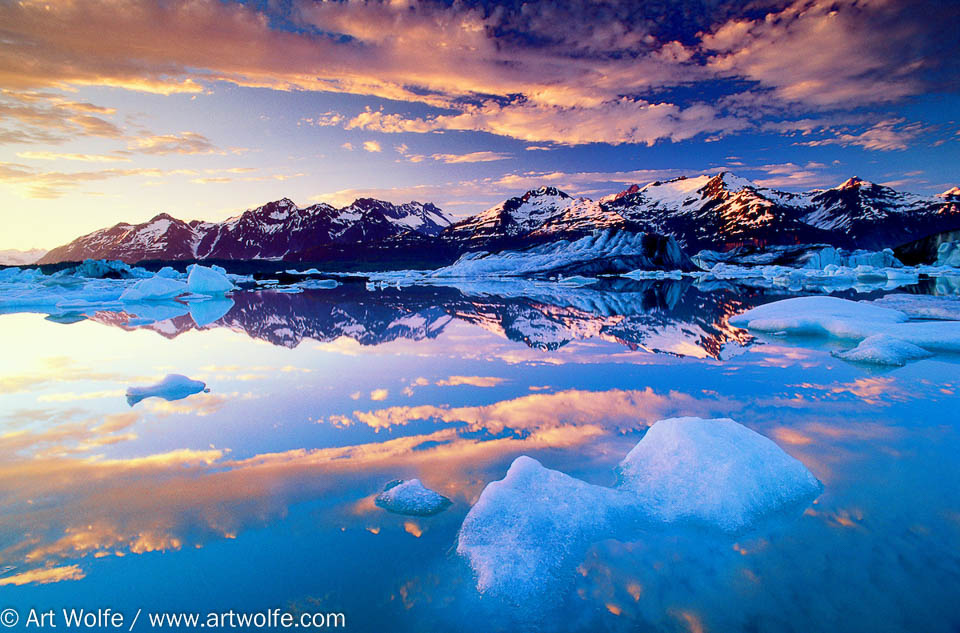Capturing The Spirit With A Single Photo

(This piece is posted with permission.) 1Frame4Nature is a collection of images and stories from around the globe of your personal connection to nature. However small, when combined with the actions of others, your individual actions can impact real and tangible outcomes for the preservation of our planet.
Submit your story now!
Image above: Clouds catch the color of the waning light above Alaska’s magnificent Alsek mountains and lake, part of Glacier Bay National Park.
What YOU Can Do: When camping, pack it in & pack it out—leave no trace.
iLCP Fellow Art Wolfe’s 1Frame4Nature:
Early in Spring 1992 Ian Kean of the Canadian River League called me out of the clear blue. I had never heard of the River League and he had a proposal for me: he wanted me to join a group of writers and artists as the photographer for a two week float down the Tatshenshini River in western Canada and ending up in Dry Bay, Alaska. The Tatshenshini was being threatened by the proposed development of a huge copper mine, and Ian was intent on galvanizing support to protect this rich wilderness area from permanent environmental damage. Not only would it affect waters and lands on the Canadian side of the border, but the mine drainage would flow downstream into Glacier Bay and affect the rich fisheries and wildlife in the Gulf of Alaska.
Bear tracks on the banks of the Tatshenshini River, Yukon, Canada.
Of course, I jumped at this adventure and it became one of the best journeys of my life. In late July we met at the headwaters of the river on the east side of the coastal ranges in the Yukon. Anyone who’s ever been rafting knows about the incredible amount of gear and preparation that goes into such a venture. We inflated rafts and loaded them with gear and got underway on this grand adventure. Floating through a landscape is unlike any other form of travel. It can be so peaceful, then the river reminds you of its strength and your heart pounds with excitement. We saw moose along the river, and evidence of wolves and bears—their tracks imprinted on sand bars where we bivouacked.
A close-up of the rocks on the shore of the Tashenshini River, Yukon, Canada
Initially we experienced marginal weather, clouds and drizzle as we floated through dense forests and high glaciated mountains. I photographed what I call intimate landscapes, willows growing in sandbars, rushing waters opaque with glacial flour, and wildlife tracks. What I recall most vividly were the breathtaking views as we broke out of the mountains and clouds. The Saint Elias Mountains, Mount Fairweather and then the confluence with the Alsek River and its vast glacial-fed and iceberg-rich Alsek Lake is where everything came together photographically. Icebergs, mountain reflections, uncommonly still waters all combined for what would become the iconic shot. It was truly exhilarating.
Green willow branches push their way through a sandbar, Tatshenshini River, Yukon, Canada
Back in Seattle, the film developed, I provided the River League with the best photos from the journey. One image was looking east at sunset, captured the view of this timeless landscape. It was produced as a poster for fundraising and to send to lawmakers in Ottawa to drive home the epic beauty of this area. This was a wilderness to protect from exploitation forever, which it was in 1993, through no small effort on both sides of the border. The US was vigorously opposed to development, led by Vice President Al Gore. The Tatshenshini-Alsek Park is now a UNESCO World Heritage Site as well.
St. Elias Mountains, Alsek Lake, Alaska. Early morning light illuminates fog and floating icebergs, which combined with the jagged mountains creates a surrealistic view.
This is a great example of how a single salient photo can capture the spirit of a place, touch people on an emotional level and rally support. You look at the photo and cannot but think, “Of course, this must be saved, especially for generations to come.” Over the decades, it has been driven home to me time and time again, that yes, a single photo can be an exceptionally important conservation tool , connecting with people on a visceral level.
White water rafting, Alsek River, Yukon, Canada
As Earth’s land continues to be developed, it is necessary to protect greater and greater swaths of the natural environment, if not for our sanity, then certainly for our survival and the species we share the planet with. The Tatshenshini was protected nearly 25 years ago, and there is no shortage of wild areas that still have yet to be protected. I strongly encourage people to join and support local and international environmental-protection organizations. We only have one planet after all.
—Recycle & utilize sustainable alternatives, whether it’s in your day-to-day activities or camping. Simply using reusable water bottles and shopping bags is an easy thing to do that has great impact. There is great power when a lot of people do very simple things.
Grey wolf tracks in a sand bar, Tatshenshini River, Yukon, Canada






